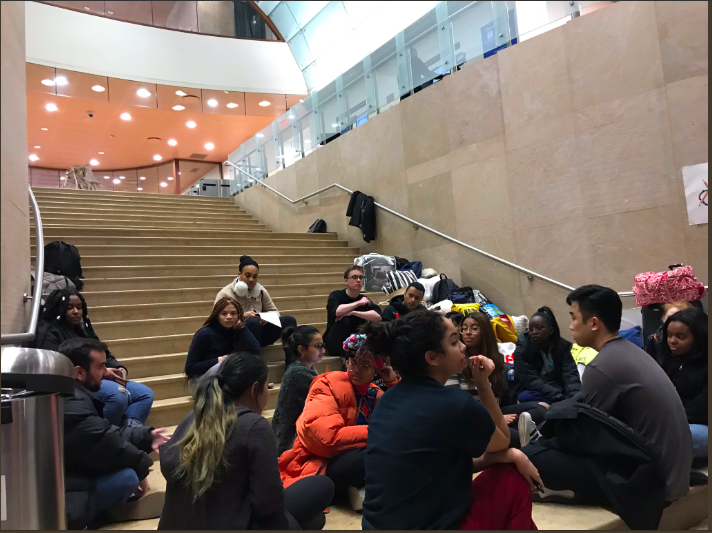As a stakeholder in this institution, it is appalling that my tuition dollars contribute to the oppression and degradation of individuals who are incarcerated,” students from New York University wrote this week in a letter to their administration.
The latest action in the student movement for university divestment from companies that profit from prisons kicked off December 3 in the library lobby of NYU, the nation’s largest private university. At time of writing, the students are on day five of their occupation. They’re demanding that the school end its partnership with Aramark—an $8.65 billion dining services corporation that supplies food to over 500 prisons and jails in the US, as well as to many other institutions, including NYU.
Aramark has been the subject of a number of past scandals involving its labor practices and food safety issues. Prison labor strike organizers have targeted Aramark for reaping profits from and perpetuating mass incarceration. Last year PBS listed their complaints against the company as including maggots and rocks being found in prison food—as well as sexual harassment, drug trafficking, employee misconduct and the general provision of bad or inadequate food.
The NYU students are protesting in solidarity. The student-led Incarceration to Education Coalition (IEC) announced on Facebook that supporters will occupy the Elmer Holmes Bobst Library atrium until NYU agrees to cut ties with Aramark. The company is also notorious on campus for racist meal themes.
“Our innovative food services keep your offenders satisfied while you keep things secure,” markets Aramark to prisons and jails. In fact, Aramark has come under fire for offering portion sizes “not even enough to fill a five-year-old child,” chicken tacos that cause “explosive diarrhea,” meatballs plucked from a trashcan and rat-nibbled cakes.
The students have support from Angela Davis, a number of criminal justice groups, and people who are incarcerated themselves.
“Thank you for exposing and fighting against predators like Aramark,” wrote Stevie, an incarcerated member of the abolitionist group Critical Resistance, in a letter to protesters. He wrote that an inmate has been “stomped to death over bread” due to Aramark’s tiny portions. At one point in a Philly prison, he wrote, Aramark had the contract for the commissary as well as for dining services. “So they starved prisoners and forced them to buy overpriced food from them in order to survive.”
The student organization demands that the university “Provide a written guarantee that NYU will provide its own dining services instead of outsourcing them to a private corporation that profits off of incarceration,” and create “A committee composed partially of IEC and other student groups to supervise this transition to self-provision.”
 But the NYU administration is pushing back. “We estimate that to self-operate would increase costs by at least 20%, costs that would be borne by students and their families,” wrote Marc Wais, senior vice president for Student Affairs at NYU, in a letter to the students. “It is not self-evident that thousands of students on meal plans would wish to pay for a 20% increase, in spite of how strongly the IEC may feel about this issue.”
But the NYU administration is pushing back. “We estimate that to self-operate would increase costs by at least 20%, costs that would be borne by students and their families,” wrote Marc Wais, senior vice president for Student Affairs at NYU, in a letter to the students. “It is not self-evident that thousands of students on meal plans would wish to pay for a 20% increase, in spite of how strongly the IEC may feel about this issue.”
The organizing done at NYU is situated within a broader national student movement to get the dining service provider off of college campuses. Barnard student activists urged the administration to end their Aramark contract in early November through a dining hall boycott. Student activism against Aramark has a history at University of Chicago, University of Virginia, and Yale, among other schools.
“The prison divestment movement is pointing out our institutional complicity in mass incarceration,” tweeted Alex Vitale, author of The End of Policing and professor of Sociology at Brooklyn College. “We are all implicated and I’ll be there.”
Photos via IEC and Alex Vitale.





Show Comments